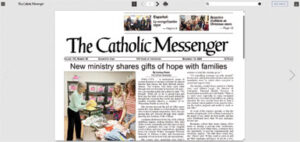By Rev. Matthew J.M. Coomber
SAU Theological Perspective

From the beginning, God had a plan for how the world should be and we celebrate its unfolding through Christ during Epiphany, which means manifestation. One of this year’s Epiphany readings that struck me was Luke 4:14–21. In it, Christ returns to Nazareth to preach in his home synagogue, sharing a message from Isaiah 61. The people’s reaction to the scroll’s promises of care for the poor, the blind, and liberation for captives reminded me of Leo Tolstoy’s three views of life. To explain, a bit of the Gospel’s context is required.
Christ frequently preached to those who took the time and effort to hear him outdoors but synagogues were great places to reach diverse audiences, which Jesus sought from the start of his ministry. Sabbath services brought together Jews and Gentiles, rich and poor, young and old, religious leaders and those thought to be possessed by unclean spirits. While Jesus’ message of liberation and healing would normally be welcome by those in Nazareth, the village’s history of trauma made Jesus’ words seem scandalous!
Although Nazareth was insignificant, unmentioned outside the New Testament, it was only an hour’s walk from the regional Roman capital of Sepphoris. In 4 bce, Judean nationalists seized control of this capital, only to have their rebellion crushed by Roman forces. The response was brutal. Romans razed the city to the ground, enslaved any surviving inhabitants, crucified thousands of rebels and forced the people to rebuild it. Everyone lost someone. Within such a keen regional trauma, Jesus and his father were likely amongst those carpenters made to reconstruct this Roman instrument of their own oppression.
In his reading of Isaiah 61 that day, Jesus made a surprising editorial choice. While he added encouraging words on liberation for the oppressed, borrowed from Isaiah 58:6, he also omitted Isaiah’s promise of God’s vengeance, conveying that no divine retribution against the Romans should be expected. The message was most unwelcome, but our Lord pressed on.
Drawing from the scroll of Kings (later divided into 1 and 2 Kings), Jesus told two stories that questioned God’s favoritism toward any people. First, he spoke of the widow of Sidon and her son: citizens of an enemy nation whom God saved — in their own land — from the very drought God used to punished Israel. Then Jesus spoke of Naaman, a foreign general whom God cured of leprosy, causing him to acknowledge God as the one true God. To Nazarenes suffering trauma and occupation, highlighting these examples of God’s care for outsiders — even leading to their conversion — was too much. The idea that Romans who had oppressed them could be transformed, loved and even welcomed into God’s community caused pain. Tolstoy’s three views of life help to shed light on their reaction.
Tolstoy understood believers as falling into one of three religious views: animal, pagan or divine. The animal view is driven by human self-gratification and sees the gods behaving just as selfishly, like Greek deities. The pagan view ties faith to one’s tribal identity. Motivated by seeking glory for their community, these believers view God’s love as selective, choosing them first. As in Roman paganism, this view frequently involves leader-worship. Finally, Tolstoy described the divine view, which understands God’s love and care as universal. Those of this view are motivated by a love as radical as Christ’s command in Matthew 5:44.
The Nazarenes who were offended by Jesus’ presentation of Isaiah 61 exhibited traits of Tolstoy’s pagan view: God was theirs and suggesting that God’s love extended to their persecutors was unbearable. I get it, and I have seen the world through that lens. People often seek meaning, safety and identity in the tribes and divisions we create.
We are quick to accept God’s grace for ourselves but slow to rejoice when that grace extends to our adversaries. Christ calls us to a new way of being. Jesus was not asking the Nazarenes to accept Roman dominance. He was showing them how to confront it as God directs us to. God calls us to liberate the oppressed, to care for the afflicted and to lift the poor out of poverty, but doing so while also loving “the other.” As I think of Jesus’ sermon, I am reminded of Martin Luther King, Jr., who saw Christ’s love as so transformative that it could convert even the most ardent segregationist.
If we are ever going to transform this world into the place that God intended it to be, we need to start trusting in Jesus’ words and conduct with the same fervor that we trust in his resurrection. At Sepphoris, the Roman Empire proved that they could withstand a rebel attack. However, can false adherences to tribal superiority and other such exclusionist mindsets survive the presence of God’s loving grace? I believe not.
(Rev. Matthew Coomber is a professor of Biblical Studies and Theology at St. Ambrose University in Davenport.)









